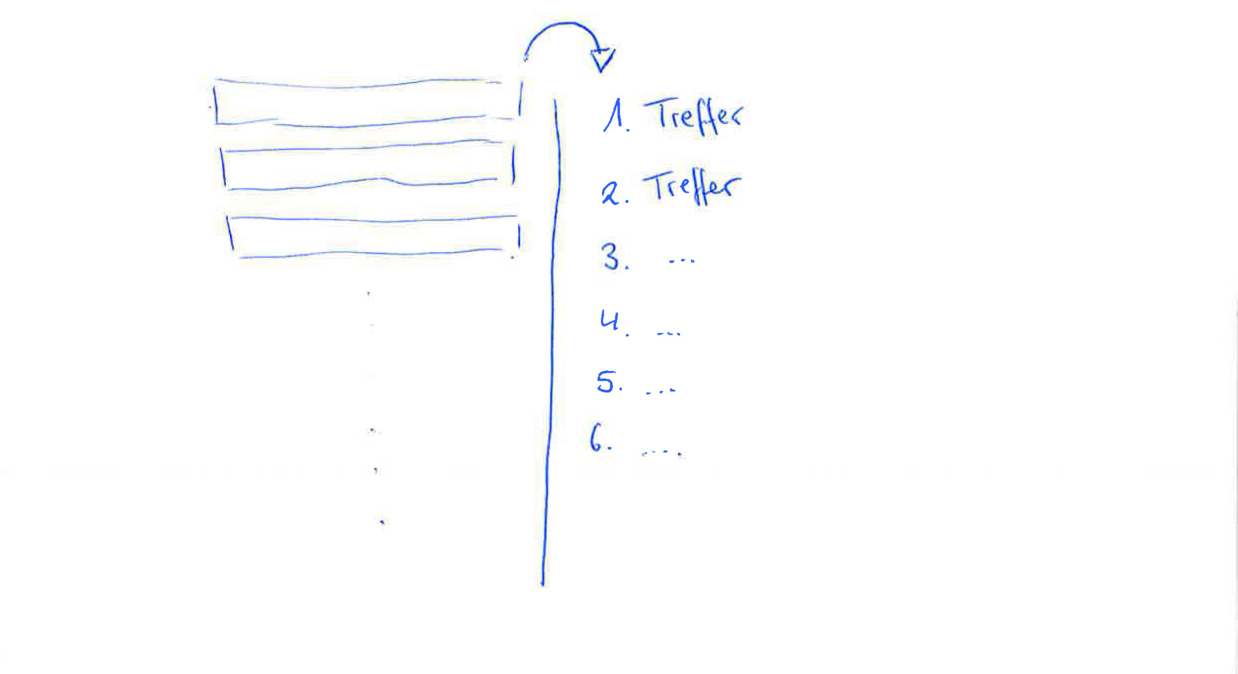An algorithm, drawn by a 26-year-old female PhD student in communication in Switzerland.

Okay, then the second task: Now draw how an algorithm works. I would leave the [recorder] running and you can already explain what you are drawing while you are drawing [whispers] How an algorithm works [silence] I suppose it's entirely up to me whether I look at the technical side or the user interface side, what you see in the end? Yes, exactly what you would draw now, so the first thing that somehow comes to your mind is Okay. I'm doing this as a split screen. We have stored databases on one side eventually. This is information that is more or less personalized for me. Okay, now this is the left image. Right. And this goes on And the boxes are databases? Exactly the boxes are data entries, which they represent for me. They can be evaluated and what comes around on the other side through this information, these are hit lists, news feeds, similar products. For which a selection is then made, these can be rankings, i.e. these are then web page hit lists, like Google spits them out. But these can also be ranked newsfeeds aspects. That is, so there we have... That's 1st hit, 2nd hit and so on. Okay, and the algorithm does what? The algorithm tries to create an own hit list based on the existing data, should this be of interest or should it be based on data such as gender or something like that, so that similar users who have similar characteristics can draw conclusions, or based on data stored in the past from already existing preferences. Okay, where does your knowledge of algorithms [whispers] Where does my knowledge of algorithms come from? Once it is constructed in the media, that is what you get from the media reports themselves. On the other hand, what I know about programming myself. What do you know about programming? How do you know that? Well, in our profession we use R, we use PHP to create databases Okay So, yes, the things you need for yourself Not by private programming or something, but more professionally Exactly what you know there in the frame. Exactly what you program yourself in detail, exactly. Yes And how databases work there. And the third thing is of course clear, I also do a little bit about Echo Chambers and so on in my projects and inevitably you get to know that bursting the filter bubble, corresponding papers and so on also deal with algorithms and how they work Okay, in your everyday life, are the algorithms aware of this? Yes, I am. Well, because I also deal with it on a scientific basis it is at least in the area of Facebook and so on quite conscious and it is also super obvious. For example I used to be a TAZ subscriber and on Facebook I only get Taz articles flushed into the newsfeed and always on the same topics. So that I have partly gone over to linking other newsoutlets on Facebook and partly to go to articles that don't interest me that much. Just to bring back the joy of finding in this newsfeed. So you try to influence the algorithm by your behaviour. Yeah, I've been trying to sneak some new data in there and does it work? Hmm, more or less well, yes. But I don't do it regularly enough. If you did it more regularly, it would probably work. So it's more of a short-term effect. Okay, cool. Thanks a lot.